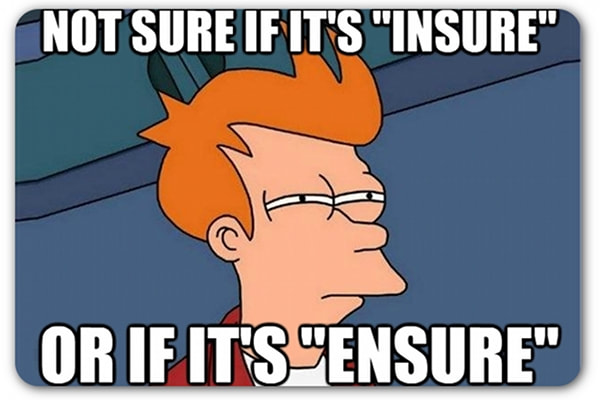 Some style guides declare that INSURE, ENSURE, and ASSURE can be used interchangeably. But some do not! What's a writer to do when even the experts don't agree? This writer has a method for distinguishing them, and I'm happy to share. Let's start with synonyms for each. INSURE: Protect, guarantee, or essentially, offer insurance. Notice how INSURE is the root word in INSURANCE? Bingo! ENSURE: Make sure, confirm, verify, secure, and guarantee. Oh no! Do you notice how guarantee shows up as a synonym for both words? ASSURE: reassure, pledge, promise, guarantee, secure, ENSURE. If you follow a particular style guide, I suggest you obey its rules. But if not, use INSURE when you're referring to insurance. Phew! That's one down. Notice how ENSURE and ASSURE are listed as synonyms? Both could be used in the following sentence, but my choice goes with ENSURE when my intent is to make sure or guarantee. I conferred with my fellow troublemakers to ENSURE they kept the record straight. In my humble opinion, ASSURE is best used to convey a promise or reassurance, rather than an ironclad guarantee. You can ASSURE someone you're telling the truth or ASSURE that you'll complete your responsibilities for a group project. I ASSURE YOU sounds better than I ENSURE YOU or I INSURE YOU. Here's an example: I ASSURE YOU I'll write you a glowing recommendation letter, as you truly deserve it. If you're still feeling less than REASSURED, I leave you with these sage words from www.merriam-webster.com: If you still feel uncomfortable and itchy when trying to decide if it is correct to assure your spouse that you will ensure that the new job will leave you insured, you can relax. Even in the judgy and nitpicky world of English usage if you choose the wrong one here it’s more of a venial sin than a mortal one. (P.S. Venial means forgivable!) I ASSURE you this spoonful is now finished. Sincerely, Laura Fineberg Cooper A Spoonful of Grammar
5 Comments
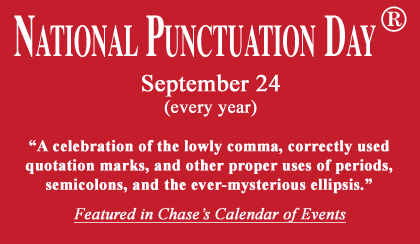 Greetings, dear readers! I just learned that Sept. 24th was the 16th annual National Punctuation Day AND that it falls on the same date every year. I hope you'll agree that a special spoonful is in order. Do you quiver for question marks? Sigh for semicolons? Clap for colons? Cry for commas? The comma, my personal favorite, has been maligned, misused, and misunderstood. To boost the poor comma's image, I'd like to share 7 fun facts: 1) There's an actual Comma Llama. Go ahead and check it out on YouTube. It has nothing to do with punctuation, FYI. 2) Mary Norris is the Comma Queen. She has some very clever videos you can view online. 3) Commas are known to cause drama with lots of writers. If you're one of those people, rest assured, you're not alone. I hope my spoonfuls help erase some of your drama and confusion. 4) Commas - or lack of them- can have drastic consequences! Do you really want to "Eat Grandma?" I certainly hope not. 5) Words that rhyme with comma: drama, llama, mama, trauma, pajama, and Obama. Did I miss any? 6) Spoonful #10: FANBOYS STRIKE AGAIN shows a wonderful poem called "Commas" by Doug Florian. 7) Picture book author Tara Lazar has a new book coming out Oct 15th called THE UPPER CASE: TROUBLE IN CAPITAL CITY. The trailer is HILARIOUS. This is new case for Private I after cracking the case of 7 ATE 9. While I'm not sure whether commas make a cameo appearance in the book, it looks like a hoot. It's never too late to celebrate your favorite punctuation. Happy Belated Punctuation Day to you all. Sincerely, Laura Fineberg Cooper  What the 'L is going on here? ALL READY and ALREADY are duking it out! ROUND ONE: In the Adverb corner, ALREADY is wearing red. She demands to throw the first punch: I ALREADY heard that song. Can you play another? In the Two Words corner, ALL READY is wearing blue. This is his response: Are you ALL READY for vacation? Did you book lodging and airfare? Did you find someone to watch the dog? ROUND TWO: Adverb: Quiet down ALREADY! My eardrums are going to pop. Two Words: Peter is ALL READY for his upcoming test, having studied for hours upon hours. IT'S A TIE because they both demonstrated proper context. Synonyms for ALREADY include "previously" and "(do it) this instant!" A good synonym for ALL READY is "prepared." ALL READY and ALREADY are now demonstrating good sportmanship by shaking hands, which signals the end of this spoonful. Until next Sunday... Sincerely, Laura Fineberg Cooper A Spoonful of Grammar 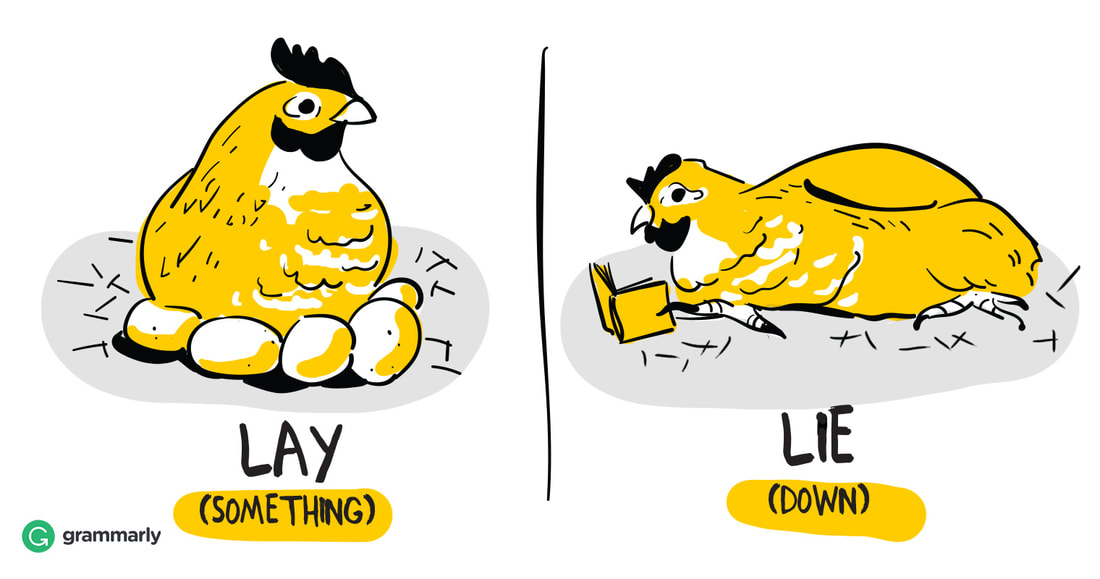 This is "wings down" the most mind boggling word trio around. Period. If you're confused, rest assured, you're in good company. But I aim to clear that confusion, so pour yourself a beverage and grab your glasses. I'll do my best to LAY the rules on you straight! Perhaps the biggest cause for confusion has to do with the mixed up present and past tense forms. So I'll take them one at a time. PRESENT TENSE: LIE is an action YOU DO FOR YOURSELF. It typically means to stretch out on the floor, bed, or couch. It's also appropriate to command another person or animal to do it, as long the ones you command are in control. (LIE is also the opposite of TRUTH, another topic entirely.) Here are two examples: 1) "It's bedtime, Spike, so LIE down," you say in your firmest voice. But Spike grabs his ball and runs circles around the kitchen table instead. 2) Oh boy, I'm feeling sleepy. I think I'm going to LIE down. LAY is appropriate when YOU'RE ACTING ON SOMEONE OR SOMETHING ELSE. Even a part of one's own self qualifies as "something else" where LAY is concerned! You can LAY a book upon a table, LAY your hand on your heart, or LAY your hand on someone else's arm. Here's a two-for-one example: When I LAY my book on the ottoman, my dog LAYS her head on top of it. Now for PAST TENSE: LAY IS THE PAST TENSE OF LIE! Now you know the root of your confusion!! Here are two examples: 1) When I LAY on my bed last night, I got the worst pain in my lower back. 2) I asked Spike to LAY down, but he ran in circles instead. LAID IS THE PAST TENSE OF LAY! At least this seems to make sense. Here's an example: When I LAID my tower of books on the table, I made triply sure they didn't fall. I'll leave you with this handy chart, courtesy of Grammar Lunchbox. Thanks for reading my humble blog. If there are any word pairs that especially vex you, let me know! I wish you all a wonderful week ahead.
Sincerely, Laura Fineberg Cooper 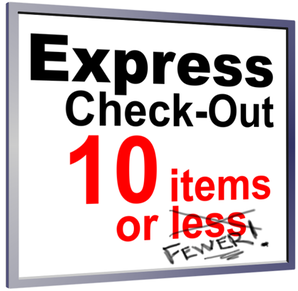 If you think LESS and FEWER mean the same thing, you're more or LESS correct. But they aren't inter-changeable! Why? I'll tell you as simply and sweetly as possible. It's a question of COUNTABILITY! 1) Use FEWER when you CAN count the nouns in question: goats, dogs, balls, chairs, boxes, teachers, lamps, calories, spoons 2) Use LESS when you CAN'T count the nouns in question: sand, milk, rice, gas, oatmeal, sugar, water, love, honesty Do you notice another difference between the two lists? Noodle that question before you look at my answer! My answer: the nouns in the FEWER list are all plural. The nouns in the LESS list are considered singular and never change form. So candy uses LESS and Hershey Kisses use FEWER, though you'll never catch me saying, "Please, give me FEWER Kisses!" However, it would be accurate for me to say, "I eat LESS candy now than I did in my youth." What about "10 items or LESS?" I'm sure you've all seen a sign like that, as they appear in most grocery stores. 10 items are definitely countable, and the word "items" is plural as well. It seems pretty clear that "10 items or FEWER" would be more accurate. I concede, however, that "10 items or LESS" sounds better. You be the judge! Thank you for reading and sharing "A Spoonful of Grammar." Tune in next Sunday for another tricky word pair. Or sign up to receive my posts directly in your inbox. Sincerely, Laura Fineberg Cooper |
Welcome to
|
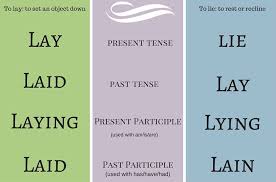
 RSS Feed
RSS Feed
